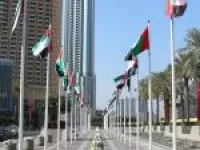
Why Non-Emiratis Can No Longer Use National Dialect Or Dress In Social Media Advertising (image-instagram/hhshklatifa)
The UAE government has recently implemented a new media policy, ensuring that only its citizens can speak in the Emirati dialect and wear national dress when filming for social media content. The new step was taken to protect and preserve the country’s identity.
Concerns were raised earlier by the members at the latest Federal National Council session over non-Emirati content creators representing local culture and customs for monetary benefits. The UAE consultative parliamentary body issued a regulatory policy banning non-citizens from wearing Emirati attire and using Emirati vocabulary for advertisements online.
Read also: Alhind Tours, GreenNetZero LTD, And Al Sahara Group Sign MoU For Electric Bus Operations In GCC
However, the officials had stated that this new law will not restrict the general use of the Emirati dialect in media in general and will only apply to social media posts made by content creators and advertisers. They further added that the measures were introduced to protect national identity and to ensure content using the UAE dialect or other national symbols reflects the country’s cultural values.
The National Media Office, in its statement, had also warned that legal actions would be taken against those who violated these directives, in accordance with UAE laws designed to maintain a “safe and balanced digital environment that encourages mutual respect”, according to a statement by the Emirates News Agency (WAM).
Though the official language across the Gulf and Arab countries is Arabic, each country has its own dialect. The dialects could be categorised in groups sometimes because of their similarities, such as “Levantine Arabic” or “Gulf Arabic”, but there is a palpable difference between them.
Read also: Most UAE Firms Pause Hiring In First Quarter; Here’s Why
The differences among them are usually informed by their different histories and cultures. Within the country, there could be differences as well. Emirati Arabic is the native dialect of the Emirati people and serves as a key marker of national identity.
Though Bedouin Arabic is common in rural areas and has a more traditional tone, urban centres like Dubai and Abu Dhabi use modernised dialects which are influenced by globalisation and multicultural interaction.













